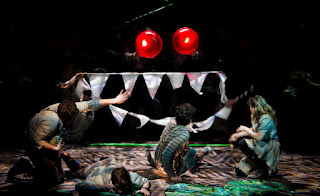Elles (2012)
Starring Juliette Binoche, Anaïs Demoustier, Joanna Kulig, and Louis-Do de Lencquesaing
Directed by Malgorzata Szumowska
***This film is currently streaming on Netflix***
I guess Elles is supposed to be a provocative female-centric view of sexuality, but when you look beyond the graphic sex scenes, there's an odd story that I just can't comprehend. Magazine columnist Anne (Juliette Binoche) has been doing research on college students willingly turning to prostitution in order to earn money to both go to school and make a decent living. We join her for a day in her life as her deadline is fast approaching and she remembers back to her interviews with the French-born Charlotte (Anaïs Demoustier) and the Polish Alicja (Joanna Kulig). As she remembers the accounts of some of the girls' escapades (which we see in explicit detail...although with surprisingly less nudity than I expected given the subject matter), Anne realizes that neither girl really has any regrets with their lives. Sure, it has caused some tension with boyfriends and family, but their lives at the moment are okay.
This realization makes Anne ponder that her "suburban" lifestyle as a wife and mother is binding her to a more puritan mindset than she'd maybe like. As she burns her hand with her wedding ring or slices her ring finger while doing the "wifely duty" of preparing a meal for her husband (Louis-Do de Lencquesaing) and his boss, the symbolism of "marriage" equaling "pain" couldn't be more obvious. In that regard, I just really didn't grasp what exactly I was supposed to be feeling after I finished watching director and co-writer Malgorzata Szumowska's film. Is the freedom of prostitution supposed to be an ideal situation for a woman? Is marriage a prison sentence? Or is there an in-between that's more balanced and suitable? Are the clients of a prostitute and the husbands in a marriage the equivalent in that they have control over the women in their lives? And are women simply fooling themselves into thinking they're anything other than pawns of men, constantly dependent on them to maintain any type of lifestyle?
In the end, what I came away with was utter confusion. I didn't know what Elles wanted me to feel after watching it. The performances are fine (I particularly like Anaïs Demoustier whose character is given a bit more heft than her Polish counterpart), but they aren't spectacular enough to warrant a rave.
I will admit that as a guy, the only reason I even gave this a try was because of the subject matter. A French film with an NC-17 rating has to equal nudity...and who doesn't want to watch that? [Call me a sexist pig if you must, but I must also admit that this wasn't simply an "out of the blue" choice...I had read about it when it came to local arthouse, but didn't find the premise interesting enough to actually pay for it.] But then when it finished, I couldn't help but think that it's a movie that has high aspirations of being something important and provocative (both sexually and intellectually), but fails to communicate its true intentions in any manner.
This realization makes Anne ponder that her "suburban" lifestyle as a wife and mother is binding her to a more puritan mindset than she'd maybe like. As she burns her hand with her wedding ring or slices her ring finger while doing the "wifely duty" of preparing a meal for her husband (Louis-Do de Lencquesaing) and his boss, the symbolism of "marriage" equaling "pain" couldn't be more obvious. In that regard, I just really didn't grasp what exactly I was supposed to be feeling after I finished watching director and co-writer Malgorzata Szumowska's film. Is the freedom of prostitution supposed to be an ideal situation for a woman? Is marriage a prison sentence? Or is there an in-between that's more balanced and suitable? Are the clients of a prostitute and the husbands in a marriage the equivalent in that they have control over the women in their lives? And are women simply fooling themselves into thinking they're anything other than pawns of men, constantly dependent on them to maintain any type of lifestyle?
In the end, what I came away with was utter confusion. I didn't know what Elles wanted me to feel after watching it. The performances are fine (I particularly like Anaïs Demoustier whose character is given a bit more heft than her Polish counterpart), but they aren't spectacular enough to warrant a rave.
I will admit that as a guy, the only reason I even gave this a try was because of the subject matter. A French film with an NC-17 rating has to equal nudity...and who doesn't want to watch that? [Call me a sexist pig if you must, but I must also admit that this wasn't simply an "out of the blue" choice...I had read about it when it came to local arthouse, but didn't find the premise interesting enough to actually pay for it.] But then when it finished, I couldn't help but think that it's a movie that has high aspirations of being something important and provocative (both sexually and intellectually), but fails to communicate its true intentions in any manner.
The RyMickey Rating: C-








